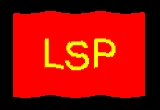
Socialist Party of Lithuania
Encyclopedia
Socialist Party of Lithuania was a Marxist
political party in Lithuania
. It was formed on March 26, 1994, The principal creators of the LSP were J.Sakalauskas, Albinas Visockas, who was to be elected leader of the newly formed party at the LSP 1st party congress, and Michailas Bugakovas. In 1997, former member of the Democratic Labour Party of Lithuania
Mindaugas Stakvilevičius was elected leader and remained so until 2006 when the 7th party Congress of the LSP on October 28, 2006 elected the new leader of the party, Giedrius Petružis, who was leader until merger with the Front Party
. The highest organ of the party was the Congress of the LSP. It elected the Council of the party and the management board.
and Lithuania's other neighbours. economically it supports a State regulated, socially oriented market economy
- with the production forces and relations of production the managements goal. Markets in the system - as far as possible, and state regulation - as needed. It considers the principles of state regulation as the best economic development incentive.
, the theory of Marxism
and contemporary social science. It believed that Socialists should unambiguously disassociate from Stalinist and totalitarian theories and practice. LSP propagated what it believed to be the new 21st century socialism
.
Marxism
Marxism is an economic and sociopolitical worldview and method of socioeconomic inquiry that centers upon a materialist interpretation of history, a dialectical view of social change, and an analysis and critique of the development of capitalism. Marxism was pioneered in the early to mid 19th...
political party in Lithuania
Lithuania
Lithuania , officially the Republic of Lithuania is a country in Northern Europe, the biggest of the three Baltic states. It is situated along the southeastern shore of the Baltic Sea, whereby to the west lie Sweden and Denmark...
. It was formed on March 26, 1994, The principal creators of the LSP were J.Sakalauskas, Albinas Visockas, who was to be elected leader of the newly formed party at the LSP 1st party congress, and Michailas Bugakovas. In 1997, former member of the Democratic Labour Party of Lithuania
Democratic Labour Party of Lithuania
Democratic Labour Party of Lithuania was a social democratic political party in Lithuania, that emerged out of the Lithuanian section of the CPSU in December 1989 LDDP was led by Algirdas Brazauskas, the first president of independent Lithuania. Because Brazauskas was elected as the first...
Mindaugas Stakvilevičius was elected leader and remained so until 2006 when the 7th party Congress of the LSP on October 28, 2006 elected the new leader of the party, Giedrius Petružis, who was leader until merger with the Front Party
Front Party
The Front Party was a socialist political party in Lithuania established in 2008 by Algirdas Paleckis. It participated in the 2008 Lithuanian parliamentary elections but failed to reach the 5% cutoff and sent no members to the Seimas....
. The highest organ of the party was the Congress of the LSP. It elected the Council of the party and the management board.
Party platform
The credo of the LSP party program was "Socialism, democracy and independence". The program of LSP was oriented towards the social state of Lithuania and what it considered in the future to be towards the new socialism. In foreign politics the party emphasized the need for a consistent policy of neutrality and good and friendly relations with all states, especially the other Baltic statesBaltic states
The term Baltic states refers to the Baltic territories which gained independence from the Russian Empire in the wake of World War I: primarily the contiguous trio of Estonia, Latvia, Lithuania ; Finland also fell within the scope of the term after initially gaining independence in the 1920s.The...
and Lithuania's other neighbours. economically it supports a State regulated, socially oriented market economy
Market economy
A market economy is an economy in which the prices of goods and services are determined in a free price system. This is often contrasted with a state-directed or planned economy. Market economies can range from hypothetically pure laissez-faire variants to an assortment of real-world mixed...
- with the production forces and relations of production the managements goal. Markets in the system - as far as possible, and state regulation - as needed. It considers the principles of state regulation as the best economic development incentive.
Party ideology
The LSP ideology was based on the methodology of dialectical materialismDialectical materialism
Dialectical materialism is a strand of Marxism synthesizing Hegel's dialectics. The idea was originally invented by Moses Hess and it was later developed by Karl Marx and Friedrich Engels...
, the theory of Marxism
Marxism
Marxism is an economic and sociopolitical worldview and method of socioeconomic inquiry that centers upon a materialist interpretation of history, a dialectical view of social change, and an analysis and critique of the development of capitalism. Marxism was pioneered in the early to mid 19th...
and contemporary social science. It believed that Socialists should unambiguously disassociate from Stalinist and totalitarian theories and practice. LSP propagated what it believed to be the new 21st century socialism
Socialism
Socialism is an economic system characterized by social ownership of the means of production and cooperative management of the economy; or a political philosophy advocating such a system. "Social ownership" may refer to any one of, or a combination of, the following: cooperative enterprises,...
.

